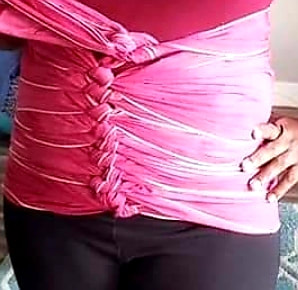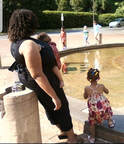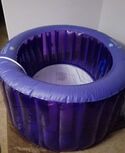|
6/28/2020 2 Comments Postpartum Belly Binding Our bodies are amazing. They stretch and grow to accommodate the life growing within. Our bodies nourish and protect our babies. When we forget our belly has grown in size and misjudge the width of a doorway, we have lots of fluids and tissue to protect our babies from those minor bumps. (I know I'm not the only one who has forgotten the belly and walked into a door frame or two!) If the baby needs more room, our stomach and kidneys will scoot over a little bit and our diaphragm squishes up a little higher. Everything makes room for baby! After our babies are born, we are left with an empty womb, a mushy space. Our organs will eventually return to their pre-pregnancy positions, and we will regain our sense of balance. But what happens until then? How can we honor the empty space where our babies once grew? Postpartum belly binding provides 360 degrees of support while our bodies heal. Binding supports the back and abdominal muscles while preventing slouching. This ancient art is practiced in a variety of ways throughout the world. Many cultures use fabric to support the midsection and assist with postpartum recovery. MINE-R-T Doulas are trained in Bengkung Belly Binding, commonly practiced in Malaysia. Using cotton, muslin, or batik fabric, our doulas wrap your midsection and tie a series of knots to assist with postpartum healing. Binding helps the muscles to heal together rather than apart, reducing diastasis recti. Belly binding may improve posture and provide additional support to loosened ligaments as they regain their strength following pregnancy.
2 Comments
6/21/2020 0 Comments Wait Until Your Father Comes HomeMy father wrote this essay for Father's Day in 1984. It was first published in our local newspaper, Erie Times-News, in honor of his late father, Charley J. Pittman (1922-1975).  For Mother's Day, I wrote about my mom. For Father's Day, I guess it’s only fair that I write about my dad. Besides, that’s the way Dad would have liked it. He advocated for equal rights, especially when there was a Pittman involved. Charley James Pittman was the backbone in the Pittman family and no one ever questioned his role as leader. Dad was tough because he had to be. But he was far from being perfect - because I believe that’s the way he wanted to be. Laying Down the Law He set tough standards for his children and expected us to live up to them. He desperately wanted our lives to be better than the one he had to endure. Born and raised in Red Springs, NC as one of six children, he was forced to drop out of school in eighth grade to help support his family. After becoming a Master Sergeant in the Army during World War II, he married my mom and went to work as a steelworker in Baltimore. There, he worked for 29 years before dying of cancer at the age of 53 in 1975. You see, my father was no one special. He had no degrees or titles. All he knew was what he wanted for his family -- and what he didn’t want them to be. He knew the environment that we grew up in didn’t lend itself to producing successful people. He showed us first hand what life in the streets was all about and what heavy drinking could do to your family life. His philosophy definitely was “Do as I say, not as I do.” He expected excellence from his children and got it. If we didn’t achieve what we were supposed to, the worst words in the world coming from Mom were, “Wait until your father comes home." Dad was not the type who accepted excuses. I remember once how, while playing first base in a critical baseball game, I missed a low throw on the back end of a double-play that almost cost us the game. After making an excuse about missing the throw, my dad said, “Charles, the ball never gets too low to catch -- now go to bat and do something about that error.” Wouldn’t you know it, I hit the game-winning home run in my next at bat. Dad supported all of our sports activities and came to almost every game. He offered encouragement when times were tough. When I was a freshman at Penn State, I called home one night complaining about how tough things were at school and how the coaches were not treating me fairly. I told my mom I was coming home from school and like a caring mom, she said, “Okay.” But Dad got on the phone and said, “NO!” - emphatically. “Do you want to work in a steel mill all your life?” he asked. “You stay there.” He went on, “If the other players can stay there, so can you.” Thanks to Dad, I stuck it out. A Tough Leader His methods were different. I believe to this day that he convinced us of all the wrongs of the streets. He decided one day never to drink, smoke or gamble again. He settled down to push us all through college and encouraged us all to pursue athletics to its fullest. Because fathers then were different from what they are now, we never really got a chance to tell Dad thanks. It seemed, then, not to be permissible for fathers to show affection or emotion. They knew their roles as head of the household, and most of them played it well. I’m so very thankful my dad did. And to Tony, Kira and Mauresa - Thanks for the breakfast on Father’s Day. Don’t worry about how it looked, because it really tasted good. And Kira, thanks for your missing tooth. It was awfully big of you to give it to me for Father’s Day rather than save it for the Tooth Fairy. 6/15/2020 0 Comments Babywearing It is Black Babywearing Week. Anthropologists believe one of the very first tools developed by humans was the infant carrier. Constructed from animal skin and plants, babywearing allowed parents to have their hands free while foraging for food. It wasn’t until the 1930s with mass production, interchangeable parts, and cheaper material that strollers became widely used in the United States to transport babies. Babywearing became fashionable again when a nurse traveled to West Africa while serving in the Peace Corps and noticed people wearing babies in a soft carrier with straps. The design became commercialized in the US, and babywearing began a resurgence in this country. Personally, I have always worn my babies. My babies enjoyed being close to me where they could rest their heads on my chest and hear the familiar sound of my heart beating -- the sound they had heard for months while developing in utero. I could see my baby was more peaceful too, calm and relaxed while in the carrier. I also felt less anxious. Medical studies show babies who are worn cry less and the practice may ease postpartum depression and anxiety in parents. I noticed something else. babywearing allowed my baby to communicate with me on a deeper level. I could feel my baby squirm when she needed to use the potty. That was how we began infant potty learning, eliminating the need for diapers. I still have a collection of slings, moby wraps, and a mei tai. My children, teenagers now, are well beyond the years of babywearing, but I still hold on to those carriers that promoted a closeness that still exists to this day.  It is very important to be intentional about building a birth team. You want to surround yourself with skill and people you trust. Ask questions that are important to you. If you don't know which questions are important, you're in luck! Here is a list of essential questions to ask a midwife: * Tell me about your experience and training. Did you attend midwifery school and complete a certification? Did you learn through an apprentice model? * How do you handle complications during pregnancy or birth? What kinds of complications would risk me out of home birth? * What happens if I am no longer a good candidate for homebirth? What is your refund policy? * Can you handle emergencies? In the event of an emergency, what would be your role? Do you remain with me if I need to transfer to a hospital? * What kind of medical equipment do you bring with you? Are you trained in the use of the equipment? * Do you have an assistant? Will I meet your assistant(s)? Who would be present for my child's birth? * Do you have backup? What happens if you're injured, ill, at another birth, out of town, or otherwise not available? * How do you handle unexpected events like preterm labor or breech presentation? * What are your fees? How are those fees structured? Do you have a cancellation/refund policy? * What is included in your fee? Labs? Tests? Pool? Birth kit? I suggest you interview 2-4 midwives before making a decision. Home birth is a safe choice for low risk pregnancies. To discuss how our team of doulas can help you plan for a home birth in the Charlotte area, please schedule a free consultation. |
AuthorKira Kimble is a doula trainer, certified doula and doula mentor. She is the owner of MINE-R-T Doula Company in Charlotte, NC Archives
July 2024
CategoriesAll Books Breastfeeding Cooking Doula Health Parenting Placenta |
 RSS Feed
RSS Feed